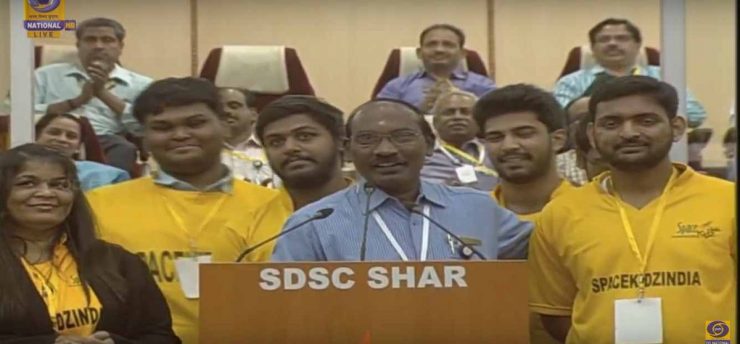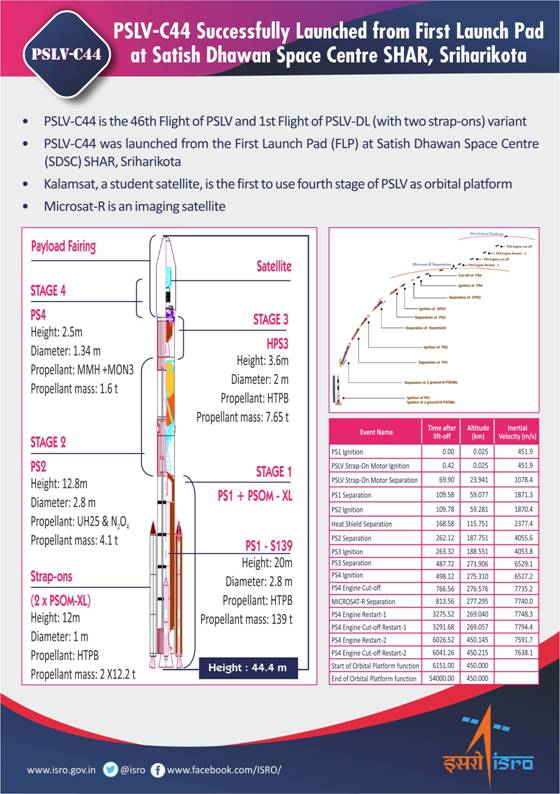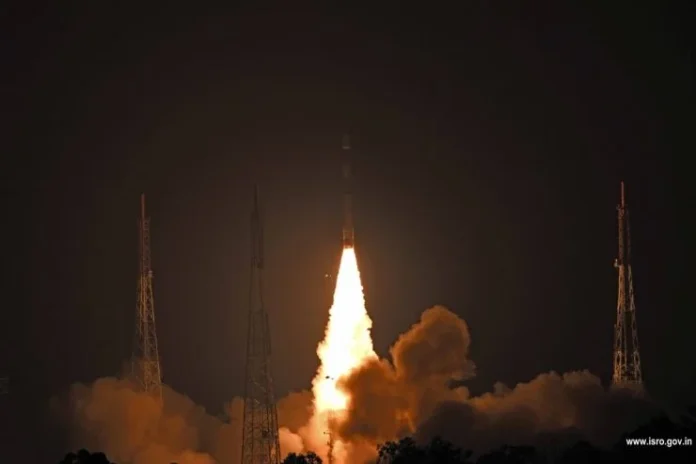Sriharikota/New Delhi. Country’s top Space Agency Indian Space Research Organisation (ISRO) successfully injected Microsat-R and Kalamsat-V2 satellites into their designated orbits from the First Launch Pad at Satish Dhawan Space Centre (SDSC) SHAR, Sriharikota on January 24.
ISRO’s Polar Satellite Launch Vehicle (PSLV-C44) successfully lifted off the two satellites, of which Kalamsat-V2 reportedly considered to be the lightest satellite in the world.
About 13 minutes 26 seconds after lift-off, Microsat-R was successfully injected into intended orbit of 274 km. After injection, two solar arrays of the satellite were deployed automatically and ISRO Telemetry Tracking & Command Network (ISTRAC) at Bengaluru assumed control of the satellite.
Subsequently, the fourth stage (PS4) of the vehicle was moved to a higher circular orbit of 453 km after two restarts of the stage, to establish an orbital platform for carrying out experiments. Kalamsat-V2, a student payload, first to use PS4 as an orbital platform, was taken to its designated orbit about one hour and 40 minutes after lift-off.
This latest successful launch marked the first mission of PSLV-DL, a new variant of PSLV with two strap-on motors.
In the previous PSLV launch on November 29, PSLV-C43 had successfully launched India’s HysIS as well as 30 customer satellites from abroad.
In his post-launch address, ISRO Chairman Dr K Sivan said the PSLV-C44 mission was unique as it was for the first time ISRO used the last stage of the rocket as a platform to perform experiments in space.
“I hope the student community will make use of this opportunity being provided by ISRO. This new low cost technology will help students to conduct several inspiring experiments in space by attaching their instruments to the last stage of the rocket,” Dr Sivan said.

He congratulated Kalamsat-V2 team for their perfection in making satellites. “We must strive for science-oriented India. ISRO is open to all students across India. We want students to bring their satellites to us and we will launch them. Young scientists will shape the future of India,” Dr Sivan said.
The ISRO Chairman also introduced the Kalamsat-V2 team. Mission Director R Hutton thanked the entire PSLV-C44 team for their relentless efforts in making the launch successful.

It may be noted here that on January 24, Dr Sivan held the third edition of Samwad with Students (SwS) in Sriharikota. Over 300 students from schools in and around the region had an opportunity to interact with him.
SwS is the newly-launched outreach initiative of ISRO to instill scientific temper among youngsters. The first edition was held in Bengaluru on the new year day on January 1 and the second one at Kochi on January 20.
“Concentrate on the present with full sincerity. Dilemmas will disappear. A good student is not afraid of failure. Failures are important for learning as they open up new avenues,” Dr Sivan told the SwS participants.
Prime Minister Narendra Modi, in his micro-blogging site Twitter, has congratulated the ISRO and its scientists for the successful mission. His Tweet read: “With this launch, India also becomes the first country to use the fourth stage of a space rocket as an orbital platform for micro-gravity experiments.”





